Men Make The Navy - The Navy Makes Men - 1942
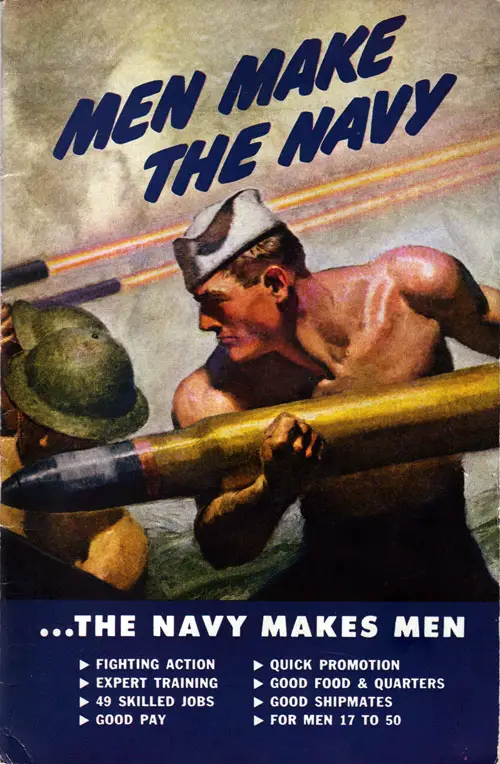
1942-05-10 Booklet: Men Make The Navy ... The Navy Makes Men. Printed by U.S. Navy Recruiting Bureau.
The information contained in this booklet regarding enlistments of men between the ages of 18 and 37 (inclusive), is outdated; in view of Executive Order of December 5th, 1942, stopping voluntary enlistments of men in the above age group.
Men 17 years of age (with parental consent) and those who have reached their 38th birthday but are not older than 50 years and six months, can still enlist. Detailed information may be obtained from the nearest Navy Recruiting Station listed in this booklet.
Nin-33776-10-5-42500M- (REVISED)
THIS IS YOUR WAR
Never in all history has the call for defenders of freedom been so urgent as at this moment.
Brave men are needed — stout-hearted men —men who would rather fight to stay free than live to be slaves.
If that's the way you feel about it, your place right now is with the Navy — your Navy — in America's first line of attack —shoulder to shoulder with the red-blooded men of action who are determined to defeat the Axis,who are not only remembering Pearl Harbor — but are doing something about it.
It's your war — as well as theirs. And the Navy needs your help to win it. All the warships, all the fighting planes America can produce, count for nothing without the men to man them. Skilled men who know their jobs. Fighting men who want action. Patriots who love their country — and serve it as true Americans should.
There's a big job to be done. There's a big opportunity for the men who do it. The following pages will tell you about it. I hope you will read them — every word.
Secretary of the Navy
Enlisted men are the backbone of the Navy. They are real heroes, who ask for nothing greater than the chance to help win the war — and the opportunity to show they've got the stuff to do it. To these men of action — men who join the Navy to serve their flag and country, regardless of grade or rank —this booklet is dedicated.
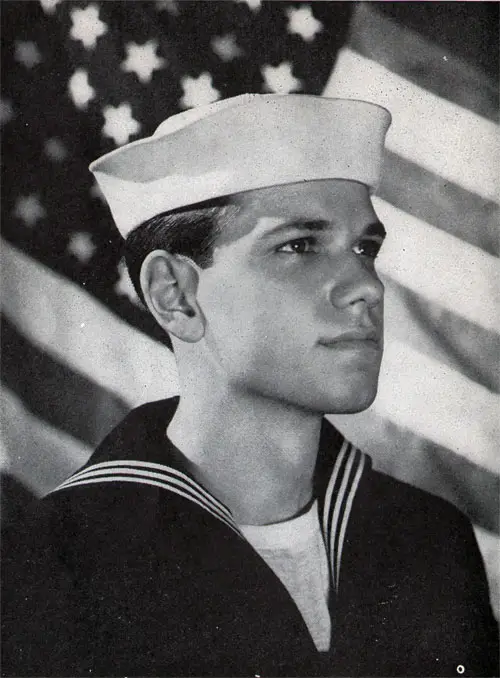
Enlisted Men Are The Backbone Of The Navy
TO EVERY MAN WHO WANTS TO SERVE HIS COUNTRY
You have an important decision to make.
Today, every true American is asking himself one question. It comes from the heart : "How can I help my country most?"
Many of your friends have already answered your country's call to service. More will be going. You, too, are ready, eager to do your part. But you want to serve, and rightly so, where America needs you most — where you can do the most for your country, and for yourself.
Choose now while you can
Make your decision carefully. But make it while you still have time. Choose a service that will give you action, thrills, adventure, travel. A service where you'll live a rugged, healthy, outdoor life that will build you up physically. A service that will make you an expert at a skilled trade, fit you to do a better fighting job now, fit you to land a better peacetime job later on.
Take a step you will be proud of all your life — volunteer now for the United States Navy.
You must act quickly
Many men who have delayed too long in volunteering for the Navy now regret it. Don't wait till it's too late. Choose your service while you are still free to do so. Remember, even though you have received your orders to report for induction under Selective Service, you may still volunteer for the Navy. You can do so right up to the actual moment of your induction.
There are no finer men in all the world than those who serve in the United States Navy.
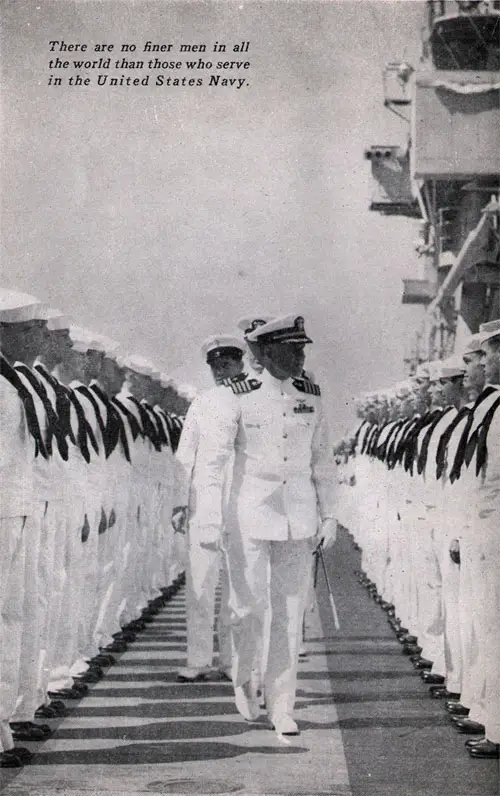
Inpsection Of The Sailors On Deck
A GREAT SERVICE FOR YOUR COUNTRY FOR YOU
Great—because of its ships and planes
The might of industrial America is laboring night and day to produce the most powerful Navy the world has ever seen. Battleships, cruisers, destroyers, aircraft carriers, torpedo boats, sub chasers, submarines — every day new ships slide down the ways. Airplanes, too — lightning-fast fighters, deadly hell-divers, giant long-range bombers — we're turning them out at a rate no enemy can even approach.
But your Navy is more than ships and planes . . . It's a world-wide network of land bases — bases for ships, planes, tankers, transports, hospital ships. It includes dry docks, wharves, machine shops, ramps, anchorages, barracks. It's a vast fleet of armed merchant ships carrying weapons of war across the seas. It's a great system of steel mills, factories, arsenals, ordnance depots. It's air power and air bases. It's more than a score of the finest training schools in the world.
Great because of its officers and men
As our Navy is great — so are its men. Red-blooded Americans who have got NA hat it takes to fight for their country. Men who are physically fit, mentally alert. Men of action, men of responsibility. Men wh9 live up to the glorious tradition of courage and heroism that has made the U. S. Navy the finest in the world.
That's the kind of officers and men who serve in the United States Navy. That's the service you can join today. That's the opportunity which is yours — if you act now.
Stand by to dive! Men on submarine duty see plenty of exciting action. And they get extra pay.
How would you like to serve on this mile-a-minute Torpedo Boat? It one of the deadliest ships afloat.
Ask any man why he volunteered. He'll tell you quick : "I want to do my part in winning the war. I want action — and you get it in the Navy !" The kind of action and adventure that thrills a he-man down to his toes ! The kind of action Bulkeley got when he and his heroic PT boat crews took on a Jap fleet single-handed. The kind of action found by Aviation Machinist's Mate Donald Mason, who "sighted sub, sank same." The kind of action O'Hare met when he took off in his lone Navy fighter, waded in and licked a whole squadron of Jap bombers. The kind of action the Pacific Fleet got when it helped smash the Japs at Midway Island. That's real action! You'll get it in the Navy !
YOU'LL GET IT IN THE NAVY!
Salvo! Navy guns hurl their shells 10 miles or more.
YOU, TOO, CAN WRITE YOUR NAME IN YOUR COUNTRY'S HISTORY
Seaman William Parker of Picayune, Mississippi, was awarded the Navy Cross for extraordinary heroism during the Japanese attacks on Pearl Harbor and Wake Island. After graduation from high school, he spent two years in the Army before enlisting in the Navy in 1940.
Chief Machinist Donald K. Ross of Fort Collins, Colorado, a Warrant Officer who enlisted as Apprentice Seaman and who symbolizes the great opportunities for advancement in the Navy, was awarded the Congressional Medal of Honor. When his station in a dynamo room became almost untenable due to smoke, steam and heat, he forced his men to leave, performed all duties himself until blinded and unconscious.
Pharmacist's Mate Lionel Baker of Rochester, N. Y., was awarded the Navy Cross. Stationed on the U. S. S. Vestal, he was cited for his heroic conduct in treating wounded shipmates while under heavy machine-gun fire at Pearl Harbor.
Boatswain's Mate Harold Smith of Brookfield, Ohio, was awarded the Navy Cross. He was cited for heroic conduct in action on the U. S. S. Arizona when that ship was under heavy fire during the Japanese attack on Pearl Harbor. Smith enlisted in the Navy soon after graduation from high school, has had active duty ever since.
Chief Pay Clerk Clifford Hanson of Tyler, Minnesota, who enlisted as Apprentice Seaman and became a Warrant Officer, was awarded the Navy Cross. During a heavy attack on Cavite in the Philippines, he deliberately braved the danger of exploding munitions and burning buildings to remove Navy funds to safety.
Aviation Machinist's Mete Leonard Wagoner of Norfolk, Virginia, was awarded the Navy Cross. He was a member of the crew of a patrol plane operating off Hawaii. Sighting eight Army men adrift in a rubber boat, Wagoner assisted in bringing the plane down in heavy seas to effect a brilliant rescue.
Afloat or ashore life in the Navy keeps you in shipshape physical condition.
THE NAVY MAKES MEN!
The prime requisite of a first-class Navy man is a sound, healthy body. That doesn't mean you have to be a perfect physical specimen to get in the Navy. In fact, physical requirements have recently been modified. Normal good health is now sufficient. But you will be in top-notch physical trim after just a few short weeks of Navy life.
Navy training takes care of that. Look at the two sketches below. They show an accurate, composite picture, of the improvement of the average recruit after only six weeks of Navy training. Compare the posture. See how the slumped, undeveloped condition has been corrected to a smart, erect carriage. Notice the gain in height, in weight, in hard, powerful muscles. That's what Navy physical conditioning does. It makes men. Rugged, husky, fighting men who can take it — and dish it out !
93% STRONGER! That's what only 6 weeks of Navy life may do for you!
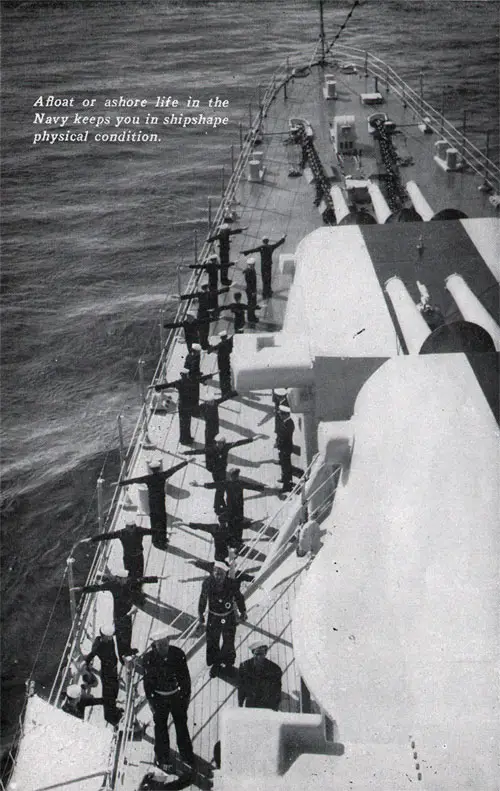
Afloat or ashore, life in the Navy keeps you in shipshape physical condition.
KEEP FIT TO FIGHT!
There's nothing like Navy life to keep a fellow fit for action. Three big meals a day ashore or afloat, comfortable bunks to sleep in, rugged outdoor activity — that sort of life will keep any man in fighting trim — ready for anything !
You won't have a chance to go "stale" in the Navy. You'll have your share of recreation, too. He-man sports that will put you in shape, keep you on your toes. And the finest group of fellows in the world for your shipmates. Men you'll be proud to work with, live with, serve with. Men you'll be proud to call your pals.
"Enemy sighted!" Anti-aircraft gun crews have to be ready for action at all times.
FIGHT TO KEEP FIT
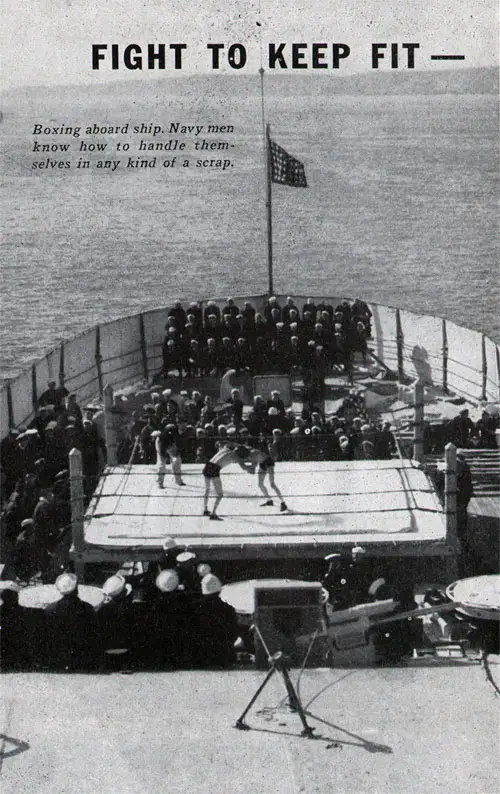
Boxing Match Abord Ship
Boxing aboard ship. Navy men know how to handle themselves in any kind of a scrap.
YOU GET THE FINEST MEDICAL AND DENTAL CARE TO KEEP YOU READY FOR .. .
A good fighting man is a healthy man. Navy training makes you healthy. Navy physicians make sure you keep in the best of good health. Regular physical check-ups, periodic dental attention, help Navy men stay in tip-top condition at all times.
Navy doctors and dentists are the finest. They are trained in the nation's top medical schools. They are given the best of equipment, ashore and afloat.
And in the Navy all your medical attention is free. No Bluejacket ever has to worry about a doctor's or dentist's bill.
Bull's-eye! Destroyer launches torpedo at an enemy ship.
Navy cooks know how to turn out the kind of pies that make a fellow's mouth water.
A Navy man is famous for his appetite. The food's so good you'll want "seconds" — and you'll get them!
They get it in the Navy. Three square meals a day — wholesome, hearty meals that stick to a fellow's ribs — the kind of meals a man likes, the kind he needs to do a man's job.
And what food it is! Your own pother would approve of the meals enlisted men enjoy both ashore and afloat. Expert Navy cooks are trained in some of the country's finest restaurants and hotels. Skilled Navy bakers turn out some of the swellest bread and pies you ever tasted. Generous rations of coffee keep the percolators bubbling day and night. And your meals are served at tables. Just take a look at the typical day's menu on the opposite page. That's real eating!
Task force. In perfect formation a part of Uncle Sam's mighty battle fleet swings to the attack.
NEED GOOD FOOD AND PLENTY OF IT!
YOUR QUARTERS ARE CLEAN .. . AIRY . . . COMFORTABLE
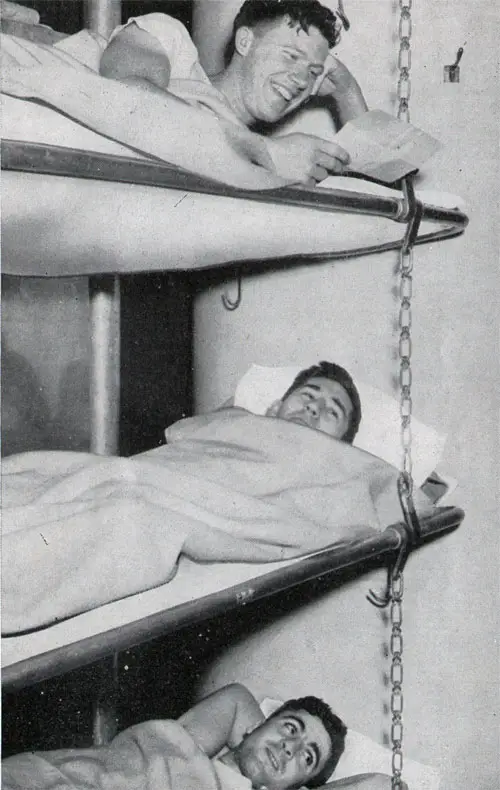
Solid Comfort - Navy's New Ships Have Spring Bunks
Uncle Sam's Bluejackets enjoy the finest, most up-to-date living quarters of any service in the world. Spring bunks, spotless washrooms, hot showers, roomy clothes lockers — these are just a few of the features of our new warships. Many ships even have barbers, tailor shops, and laundries. Recreation room, too, with a piano, games, tables for writing letters, and a library of good books. There's nothing too good for the men of the Navy !
Typical training camp washroom with plenty of hot water for shaving. Up-to-date shower baths, too!
Solid comfort! Navy's new ships have spring bunks.
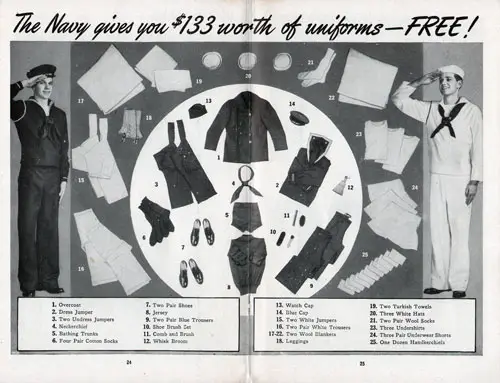
The Navy Gives You $133 Worth of Uniforms -- FREE !
1. Overcoat
2. Dress Jumper
3. Two Undress Jumpers
4. Neckerchief
5. Bathing Trunks
6. Four Pair Cotton Socks
19. Two Turkish Towels
20. Three White Hats
21. Two Pair Wool Socks
23. Three Undershirts
24. Three Pair Underwear Shorts
25. One Dozen Handkerchiefs
13. Watch Cap
14. Blue Cap
15. Two White Jumpers
16. Two Pair White Trousers 17-22. Two Wool Blankets
18. Leggings
7. Two Pair Shoes
8. Jersey
9. Two Pair Blue Trousers
10. Shoe Brush Set
11. Comb and Brush
12. Whisk Broom
Instructor demonstrates use of square shears in Navy Metalsmiths' School at Pensacola, Florida.
Navy welders at work. This is only one of nearly so trades in which you may become a well-paid expert.
FROM THE DAY YOU JOIN, YOU EARN WHILE YOU LEARN
The moment you go on active duty, you are on Uncle Sam's payroll. First, you go to one of the great Naval Training Stations. The Navy pays your way. You remain at the Training Station for about eight weeks. During this time you get to know real Navy life, Navy traditions, Navy regulations. And you have an opportunity to qualify, by your ability and initiative, for training in the trade in which you want to specialize.
Equal chance for every man
Every recruit has an equal chance for assignment to one of the Navy trade schools at the end of his training period. More than 25,000 a month are selected. Men who are not selected are sent to sea for practical experience. This does not mean that they have lost their chance for training. Once they show that they are qualified, they are returned as soon as possible to shore duty to attend advanced trade schools where they can become experts in the trade for which they have shown themselves best adapted.
The Navy wants to promote you
Remember, the Navy is just as anxious as you are to have you become an expert in a specialized field—and more than half of the men now in the Navy are skilled experts ! You will be given training and promoted as rapidly as your qualifications permit. And every day of training you get will not only make you more valuable to your country now . . . but more valuable in a well-paid civilian job after the war.
Know anything about radio now? Or have you skill in any other trade? Then here's your chance to ... cash in on your experience. If qualified, you can join the Navy
with a Petty Officer's rating in your specialty right away!
YOUR CHANCE TO BECOME A WELL-PAID EXPERT
You don't need experience. If you show the right qualifications, the Navy is ready and willing to send you to a trade school and give you training worth $1500 — the first year alone — teaching you to be an expert in the trade for which you are qualified ... helping you to develop all the skill and talent which you always knew you had.
If you're handy with tools . . . or if you like radio, photography, welding or any of nearly 50 other skilled occupations, here's your chance to get the finest training, to use the finest equipment the world has to offer. Costly metal lathes ... marvelous telescopic cameras . . . vast power and tool plants — they're all part of Navy equipment, all part of the workshop you can call your own.
You draw pay while you learn. And you can win promotion rapidly — as fast as your own skill permits. Enlisting as an Apprentice Seaman, you're automatically advanced after your 2 months' training period to Seaman, Second Class, and given an increase in pay. From there you can go up to Seaman, First Class, and then on to the various Petty Officer ratings. And remember — every promotion means a raise in your pay !
How to get special rating and pay
If you are now working as a mechanic, electrician, or in many another job, you will have every chance to continue your present type of work in the Navy. And if you have had special training or are particularly skilled in your trade, you may qualify as a Petty Officer immediately, with the higher pay and allowances that go with such a rating. Here's your chance to cash in on your experience .. . and to get the expert Navy training that will fit you for a better job than you have ever held before.
A FEW OF THE IMPORTANT JOBS YOU MAY HOLD AS A PETTY OFFICER
QUARTERMASTER
Duties: Steer the ship. Take soundings. Use range finders. Plot bearings. Operate signal control apparatus and searchlights. Correct sailing charts. Determine ship's position by sun and stars. Navigate by dead reckoning, radio bearings, soundings. Send and receive International code by blinker, searchlight, semaphore.
RELATED CIVIL JOBS: Ship Pilot, Navigator, Hydrographer.*
PHARMACIST'S MATE
Duties: Take charge of sick bay on board ship. Do minor surgery and first aid work. Prepare and administer simple medicines. Give anaesthetics. Account for hospital and medical supplies. Have basic knowledge of anatomy, physiology, medicine, drugs, hygiene, sanitation, nursing, pharmacy.
RELATED CIVIL JOBS: Pharmacist in a Drug Store, Hospital Attendant, First Aid
Instructor, Male Nurse.*
PETTY OFFICER RATINGS YOU MAY WIN
Rating badges, consisting of eagle, chevrons. and specialty mark, are worn on the sleeve between the shoulder and elbow. Your specialty mark changes according to your job.
49 WELL-PAID JOBS FOR NAVY MEN
RADIOMAN
Duties: Operate Navy radio transmitting and receiving equipment. Maintain and care for radio batteries. Send and receive on all frequencies used by the Navy. Encipher and decipher Navy code messages. Adjust and repair radio direction finders and sound equipment. Understand basic operating principles of all Navy radio and electrical equipment.
RELATED CIVIL JOBS: Radio Repairman, Licensed Radio Operator, Radio Engineer.*
Seaman Branch
Boatswain's Mate Gunner's Mate Torpedoman's Mate Turret Captain Signalman Quartermaster
Fire Controlman Seaman
Special Branch
Commissary Branch Artificer Branch (Engine Room Force)
Commissary Steward Ship's Cook Machinist's Mate
Baker Motor Machinist's Mate Water Tender
Messman Branch Boilermaker
Officers' Steward Officers' Cook Metaismith
Mess Attendant Molder
Fireman
Artificer Branch
Aviation Branch
Yeoman Electrician's Mate Radioman Aviation Pilot
Storekeeper Pharmacist's Mate Hospital Apprentice Bandmaster Radio Technician Radarman Aviation Machinist's :late Aviation Metalsmith
Musician Soundman Aviation Ra:Loman
Buglemaster Bugler Telegrapher Carpenter's Mate Patternmaker Shipfitter Aviation Electrician's Mat. Aerographer's Mate
Specialist Printer Photographer's Mate
Painter Aviation Ordnanceman Parachute Rigger
AVIATION MACHINIST'S MATE
Duties: Assemble, service and repair airplanes and airplane engines. Splice aircraft wiring. Manufacture terminals and other small parts. Know principles and theory of flying. Do seamanship work necessary to airplane ground work.
RELATED CIVIL JOBS: Mechanic, Aviation Mechanic, Engine Maintenance Man.*
*If you have had previous experience in these civil jobs, it will help you go ahead faster in the Navy. If you have not had experience, Navy training will give you a head start toward a good civilian job in thRadiomands.
For a complete description of all Navy jobs see booklet "What kind of job car, I get in the Navy?"
You never miss a pay day in the Navy. You get paid in cash afloat or ashore.
YOU CAN EARN UP TO $138.00 A MONTH AND KEEP
After only 2 months of service as Apprentice Seaman, you automatically get a raise in pay and a promotion to Seaman, Second Class. By the end of your first enlistment you can receive 7 consecutive pay increases and promotions and be earning several times as much as when you signed up.
HOW YOUR NAVY PAY GOES UP RATE MONTHLY BASE PAY
(plus keep and allowances)
- Apprentice Seaman $ 50
- Seaman, Second Class $54
- Seaman, First Class $66
- Petty Officer, Third Class $78
- Petty Officer, Second Class $96
- Petty Officer, First Class $114
- Chief Petty Officer, Acting Appointment $126
- Chief Petty Officer, Permanent Appointment $138
What are "allowances"? They are increased pay for special duties. For instance, suppose you are a Petty Officer, Third Class, making $78 a month base pay. If you are assigned to sea duty or overseas service, you will receive a special allowance which will raise your pay 20% — up to $93.60 a month.
New allowances for dependents. Under a new law, Apprentice Seamen, Seamen Second and First Class, and Petty Officers Third Class, and all others in the 4th, 5th, 6th and 7th pay grades, may contribute for their dependents $22 a month from their pay. To this amount the government will add $28 a month for a wife, plus $12 a month for the first child, $10 a month for each additional child. For other members of the family who are proved to be dependent, the government will also contribute $15 a month for one parent, $25 a month for two parents and $5 for each other family dependent up to a total of $50.
Chief Petty Officers and Petty Officers, First and Second Class, and all others in the first three pay grades with dependent families (including wife, children, and dependent father or mother) will receive a dependent's quarters allowance of $37.50 monthly.
HOW YOU CAN GET INTO NAVAL AVIATION AND "FLY WITH THE NAVY"
In the Navy you'll have the chance to join the country's top fliers in the rating of an Aviation Pilot in America's first line of attack ! You can attend the finest flying schools. You can be taught by the men who perfected dive-bombing, aircraft carriers, catapult take-offs. Scores of different jobs are open today in naval aviation in addition to actual piloting. You can become expert as an aviation machinist . . . aviation metalsmith . . . or in aerial photography .. . gunnery . . . observation . . . navigation .. . parachutes . . . bombing. And remember every Bluejacket who receives flight orders—whether as a pilot or in any other capacity —automatically receives a 50% increase in pay. And the experience you get in action will fit you for a top job in civil aviation after the war.
Chance to be a Commissioned Officer
As an enlisted man, you'll have the opportunity to win your Navy Wings and receive an Officer's Commission as a Naval Aviator. An opportunity to pilot the finest, the fastest, the fightingest warplanes in the world—the Navy planes that are the spearhead of America's attack.
Requirements are simple : High school graduate, physically fit, a straight thinker, between your 18th and 27th birthdays.
If you qualify, you will become a Naval Aviation Cadet with pay of $75 a month. You'll get the finest flight training in all aviation. You'll learn to fly the world's fastest fighters, roaring hell-divers, giant multi-motored bombers. You'll learn blind flying, bombing, gunnery, navigation. You'll be more than a flier. You'll be an all-round aviation expert !
If you pass your training successfully, you'll win your commission as Ensign in the Naval Reserve or as Second Lieutenant in the Marine Corps Reserve, with the increased pay and allowances of a Commissioned Officer.
Skilled aviation mechanics draw good pay. And Navy training puts you in line for a top job in civil aviation.
"Target for tonight!" Navy pilots map out every detail of a raid before they take off,
YOU MAY EVEN GO TO ANNAPOLIS
Every year a selected group of enlisted men are appointed to the United States Naval Academy at Annapolis. Here is an honor to which every young Navy man may aspire. Here is your chance to attend the world-famous school which has turned out the Navy's top-ranking Admirals. Here is your opportunity to get — absolutely free — an education equal to that offered in any college in the country. Upon graduation from Annapolis, you become a Commissioned Officer in the United States Navy.
United States Naval Academy at Annapolis.
"Shooting the Sun". Ever since men have gone down 'to sea a good navigator has been one of the most important and respected men aboard ship. At Annapolis you learn navigation thoroughly, along with the many other subjects an American Naval Officer must master.
YOUR FOLKS WILL BE PROUD OF YOU
You couldn't ask for a bigger thrill than a fellow gets when he comes back home wearing a smart Navy uniform. The fellows crowd around. Your folks beam with pride. They all want to know where you've been, what you've done. And do you have stories to tell!
You're proud. And you should be! Your parents are proud A you, too. The Navy receives thousands of enthusiastic letters from mothers and fathers of Navy men. These letters tell how proud parents are to have their sons serving their country. They speak in glowing terms of the splendid training their boys are getting and of the fine life they're leading.
Read what proud parents say
"You built my son into a citizen with motive, purpose and direction. In short, under your training, he found himself."
"The improvement in my son's carriage, in his bearing, in his attitude toward life has been almost unbelievable."
"I am happy to report back to you that my son is completely content with his enlistment and looks forward with keen anticipation to a career brimful of interest."
"In the Navy my son's spiritual and moral welfare was safeguarded and strengthened. No amount of well-intentioned home training could have produced such gratifying results."
"I have never met a finer group of men anywhere than the Officers and men of the Navy, and I am glad that my son is to be with men of their calibre."
NAVY TRAINING FITS YOU FOR FUTURE SUCCESS
Here are a few of the prominent men who got their start in the Navy
Movie Star Pat O'Brien served in the U. S. Navy as a seaman. His first performances were given before sailors. Today he considers his Navy experience the most important training in his life.
When Thomas A. Morgan, now President of the Sperry Corporation, enlisted in the U. S. Navy, he specialized in gyroscopic compasses, fire control, and radio. He left the Navy and joined Sperry, where his Navy experience helped him climb to the top of one of America's most vital war industries.
Pant Engineer Robert B. Kellogg started in the Navy as a gunner's mate. Today he is in charge of one of the country's most modern power plants, thanks to Navy training.
Charles Francis Coe, one of the highest paid authors in the world, enlisted in the Navy as a young man instead of going to college. Today he says, "I would not trade my Naval experience for half a dozen college degrees."
Any man in normal health should be able to pass his Navy physical exam with flying colors.
It's a proud moment when you raise your hand and swear to serve your country in the Navy.
42 REQUIREMENTS FOR ENLISTMENT IN THE NAVY AND NAVAL RESERVE
There are two branches of the Navy — the Regular Navy and the Naval Reserve.
Enlistment in the Regular Navy is for six years. Enlistment in the Naval Reserve is for two, three or four years. And, in addition, Naval Reservists will be released to get back to their jobs as soon as possible after the national emergency is over.
In the Reserve, your pay, your training, your chances for promotion are the same as in the Regular Navy. And you get this extra advantage — if qualified, you can choose the type of work you want to do before you enlist.
Here are requirements for both branches of service :
- Age — In the Regular Navy, 17 to 31. In the Naval Reserve, 17 to 50. If under 21, you must have the written consent of parents or guardian.
- Citizenship—Native-born American. If not native-born, you or your parents must have naturalization papers. You must show written proof of citizenship.
- Height — At least 5 ft. 2 in. Weight, in proportion.
- Eyes—Requirements now modified. You can qualify with combined vision (both eyes) of 15/20, not less than 6/20 in worst eye.
- Physical — You must pass a physical examination to show you are in sound health. In the Reserve, requirements are less strict than in the Regular Navy.
- Education — There are no specific educational requirements. You will take a simple test to show your ability to read, write and think clearly.
- Character — The Navy wants men of good character. When you enlist, you will be asked to furnish two references.
- Marriage—In the Regular Navy and the Naval Reserve married men with dependents are accepted. There are special new allowances for dependents.
IMPORTANT NOTICE TO MEN WHO EXPECT TO ENTER MILITARY SERVICE
Even though you have received your orders to report for induction under Selective Service, you may still volunteer for the Navy right up to the moment of your induction. After that you can no longer choose your-service. Remember, if er byo wfore
ant to get in the Navy, you've got to volunteer you are sworn in. Don't wait till it's too late.
- You go to the Recruiting Station. See the Officer in charge. You'll find him friendly, ready to talk over your situation man to man. He'll give you good advice and full details on what the Navy can do for you.
- Talk it over with your folks. Explain to them the opportunities you can get in the Navy. Most parents are glad to have their sons in a service which offers so much. If you're under 21, you'll need their consent to join.
- Back to the Recruiting Station to take your "physical." Expert Navy doctors make a thorough check-up, but it's not too difficult. Any man in normal health should pass with flying colors.
- It's a great moment in your life when the Recruiting Officer swears you in as a member of the United States Navy. From then on you're in the service of your country.
- Off to the Training Station! The Navy takes care of all expenses. Meals in the dining car. A Pullman berth for overnight travel. And you'll find comfortable quarters ready for you at the Training Station when you arrive.
- You get your first Navy uniforms. Over $133 worth of clothing is furnished you — free. Complete outfits for winter and summer. You'll be proud — and rightly so — when you step out in your smart Navy blues.
- You soon get into the swing of real Navy life. You learn Naval History, Naval traditions, Naval regulations. You lead a red-blooded, outdoor life. And you meet the swellest bunch of shipmates in the world!
- If you qualify, you go to a Navy trade school. Here you get expert training in your chosen field. Radio. perhaps. Or aviation, engineering, electricity. Whatever your specialty, Navy training makes you tops.
- You go to sea! You get action... adventure . .. travel. You'll see exciting foreign ports. You'll go places, do things, meet people. The man who said, "Join the Navy and see the world" was right!
- What a thrill it is when you step up to get your first promotion! And there are others to follow. If you work hard, you'll move ahead fast in the Navy. And remember, a generous pay increase goes with every promotion.
"WHAT HAPPENS WHEN I APPLY FOR THE NAVY?"
"I'D LIKE TO KNOW .
THE CHIEF SAYS:
"I'll be looking forward to seeing you at any of the United States Navy Recruiting Stations.'"
- Q. How many different trades and vocations are there to choose from?
- A. Forty-nine.
- Q. Is Annapolis open to me if I enlist?
- A. A selected group of men from the Regular Navy and Reserves may be chosen to attend Annapolis each year.
- Q. Does the Naval Reserve offer special inducements to me if I am skilled at a trade?
- A. Yes. If particularly qualified, you will receive the rating of a Petty Officer immediately.
- Q. What would happen if I got sick?
- A. You would receive the finest medical care absolutely free.
- Q. How long must I serve if I enlist in the Navy?
- A. Six years in the Regular Navy — 2, 3 or 4 years in the Naval Reserve. Naval Reservists may return to civilian life as soon as possible after the end of the war.
- Q. Do I have to buy my own uniform?
- A. No. You receive $133 worth of uniforms absolutely free when you enlist.
- Q. Must my parents consent to my enlistment if I am under 21?
- A. Yes.
- Q. Does a Bluejacket have to pay for his own food and board?
- A. No. The Navy gives you good food and board free.
- Q. Who pays for my meals and carfare when I am first sent to a Training Station?
- A. The Navy furnishes you all transportation and meals.
- Q. When I have received a rating in one field, may I change to another field?
- A. Yes, if qualified and if a vacancy exists. And you will not lose either your rate or your pay.
- Q. How soon can I expect a raise in the Navy?
- A. If you enlist as Apprentice Seaman, you will automatically get an increase in pay after 2 months.
- Q. How much can I expect to be earning by the end of my first enlistment?
- A. Up to $138 a month base pay, plus keep and allowances.
- Q. What recreation can I enjoy aboard ship?
- A. Boxing, wrestling, swimming, "singsongs," "acey-deucy" and many others.
- Q Can I get into Naval Aviation?
- A. Yes, and you may even win your wings as a Flying Officer.
- Q. Do I need any special qualifications to go to a Naval' Trade School?
- A. Every recruit has an equal chance to qualify.
- Q. If I have already been classified as 1-A in Selective Service, can I still enlist?
- A. Yes, up to the time you are inducted.
- Q. Can I get retirement pay if I stay in the Navy?
- A. Yes, after 30 years' service in the Regular Navy, at 3/4 pay, or after 20 years, you can transfer to the Fleet Reserve with Y2 base pay.
Talk to your nearest Navy Recruiting Officer - - TODAY!
